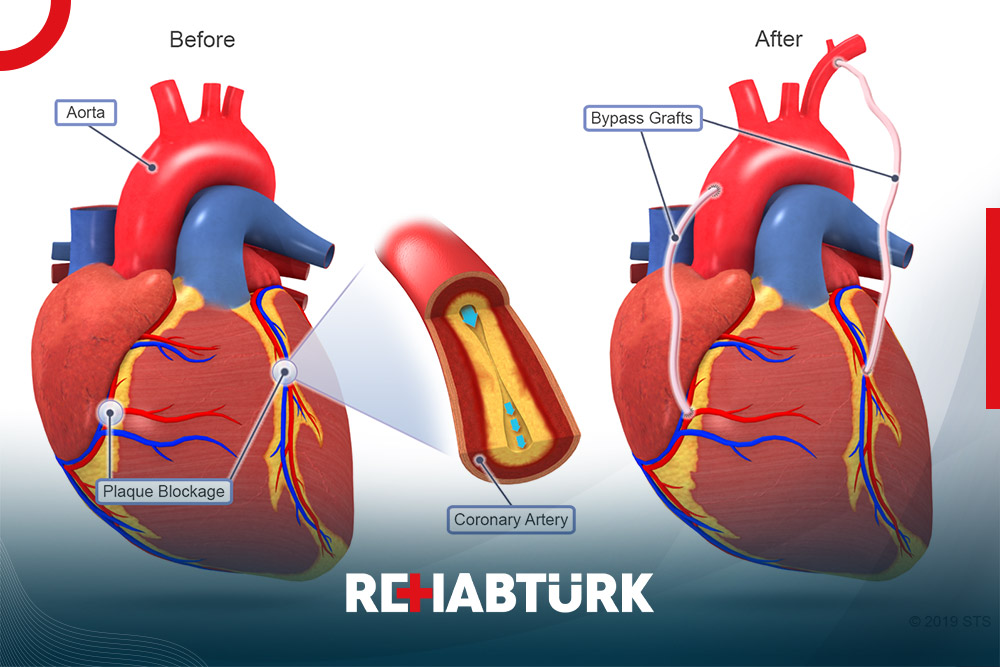Coronary artery bypass surgery in Türkiye
Coronary artery bypass bypass surgery in Türkiye is a surgical procedure that reroutes blood from around a blocked artery (in whole or in part) in the heart . The procedure involves taking a healthy blood vessel from the leg or arm and connecting it to an artery in the heart with a new route. Which improves blood flow to the heart muscle, but coronary bypass surgery does not treat the causes that led to heart disease such as atherosclerosis or coronary artery disease, but relieves symptoms such as chest pain and shortness of breath and can improve heart function and reduce the risk of death from heart disease.
Other names for bypass surgery
- Bypass surgery
- Heart bypass surgery
What is the cost of the operation?

This occurs when a substance called (plaque) accumulates, which consists mainly of fats, cholesterol, calcium and other substances present in the blood inside the coronary arteries (these arteries supply blood to the heart).
It happens that the plaque narrows or in other words blocks the coronary arteries and reduces blood flow to the heart muscle. If the obstruction is severe, angina pectoris, shortness of breath, and in some cases, a heart attack may occur.
During CABG, a healthy artery or vein from the body is connected, or grafted, to a blocked coronary artery.
NOTE: The grafted artery or vein bypasses (i.e. goes around) the blocked portion of the coronary artery. This creates a new pathway, directing oxygen-rich blood to the heart muscle.
Why coronary bypass surgery:
Coronary bypass surgery is one of the options for treating clogged arteries, i.e. if:
- Suffering from severe chest pain caused by the narrowing of many arteries that feed the heart muscle. This leads to a lack of blood supply to the muscles during light exercise or during rest.
- The presence of more than one diseased coronary artery and the main pumping chamber of the heart is not working.
- An artery blockage that cannot be treated.
- Undergoing angioplasty or placing a stent to keep the artery open when the operation was not successful previously.
- Severe left main coronary stenosis or occlusion.
- Coronary bypass surgery is performed in emergency situations such as a heart attack.
Note : The patient needs to make lifestyle changes after surgery and take medications routinely to lower blood cholesterol and reduce the risk of a blood clot.
How is the bypass operation performed?
Coronary bypass surgery takes between three to six hours and the number of bypasses used depends on where they are used and the severity of the blockage. It is performed under general anesthesia, where a breathing tube is inserted into the urethra and connected to a ventilator. Most coronary bypass surgeries are performed by making a long incision in the chest in parallel with maintaining the flow of blood and oxygen through the heart and lung machine.
The procedure begins with a surgeon cutting the middle of the chest along the breastbone, opening the rib cage to reveal the heart, then stopping the heart using medications temporarily, and the heart-lung machine takes over the pumping of blood to all parts of the body, and the surgeon takes part of healthy blood vessels from inside the chest wall or from the lower leg, and then connects The ends of the vessels above and below the blocked artery so that blood flow is redirected around the narrowed part of the affected artery.
Other surgical methods that may be used by a specialist surgeon include:
Surgery without the use of a pump or with the heart still beating: This method uses special equipment to stabilize the area of the heart that the surgeon is working on, but this method is challenging given that the heart continues to move.
Minimally invasive surgery: The surgeon performs the surgery by making several small incisions in the chest using a robot and videography that helps the surgeon operate on a small area.
Note : The surgeon restores the patient’s heartbeat after completing the operation, separates the patient from the heart-lung machine, and uses a surgical wire to close the breastbone.
What happens after the surgery?
The patient stays a day or two in the intensive care unit, and the breathing tube remains in the throat until the patient wakes up. Cardiac rehabilitation begins in the hospital, and the patient is given instructions about exercises and the program to help him recover.
In the absence of any complications, the patient is likely to be discharged from the hospital within one to two weeks, but the patient has difficulty performing daily tasks or walking a short distance, and the doctor should be contacted if the following signs or symptoms appear:
- Fever.
- fast heart rate
- New or worsening pain around the chest wound.
- The appearance of redness around the chest wound, bleeding or other secretions.
The recovery period is expected to be 12 weeks, and you can return to work, start exercising, and resume sexual activity after four to six weeks.
When is recovery after arterial bypass surgery?
The healing process is a gradual process
It is a gradual healing process. The patient may feel worse immediately after surgery than he felt before. This is normal. Because the body needs time to recover.
- Wounds will not completely heal up to two months.
- The patient may not be able to drive for 3 to 8 weeks.
- You should visit the doctor several times during the first few months
What are the risks of arterial bypass surgery?
Since coronary bypass surgery is an open heart surgery, there are complications during or after the procedure:
- bleeding.
- Arrhythmia.
- Chest wound infections.
- Memory loss or difficulty thinking clearly, which often improves within six to 12 months
- kidney problems;
- a hit.
- heart attack.
The risk of complications decreases depending on the patient’s general health and increases if the surgery was performed as an emergency measure or if he suffers from other medical conditions such as emphysema, kidney disease, diabetes, or clogged arteries in the legs.
Bypass surgery in Türkiye

Many patients come to Türkiye for bypass surgery in Türkiye.
REHABTÜRK HEALTHCARE PROVIDER NETWORK treatment services to patients in addition to transportation, accommodation and full trip coordination services.
CABG in Türkiye requires an average of 10 nights of stay in Istanbul.
Patients receive intensive post-operative care to check their condition and satisfaction after bypass surgery in Türkiye. In addition, our patient support team is available 24/7.
